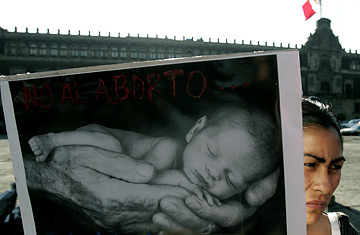
An anti-abortion activist protests in Mexico City, Thursday, March 22, 2007.
Latin America's resurgent left has been a firebrand when it comes to battling poverty, promoting indigenous rights or bashing the U.S. But on one traditionally liberal cause — legalizing abortion — it has been remarkably meek.
Abortion on demand, even in the first trimester of a pregnancy, is still illegal in all but three small countries in predominantly Roman Catholic Latin America (Cuba, Guyana and Barbados). In fact, abortion prohibitions in some countries there have gotten stricter — even in Nicaragua, where the former Marxist revolutionary Daniel Ortega recently became President again, but where the staunchly pro-life Catholic Church last fall influenced passage of the hemisphere's most draconian ban on abortion.
Now, largely in response to that unexpected stiffening of abortion laws, the first signs of a pro-choice movement are beginning to emerge in Latin America. And nowhere does it seem stronger than in Mexico, where this week a proposal to legalize abortion during the first 12 weeks of pregnancy was introduced in the Mexico City Legislative Assembly — and has what most pundits call a good chance of passing.
The Mexican capital's Assembly is controlled by the leftist Democratic Revolution Party (PRD), whose candidate, Andres Manuel Lopez Obrador, barely lost last year's presidential election to conservative President Felipe Calderon. But the measure's proponents are betting that if it passes in Mexico City, similar initiatives will gather momentum in other states — just as a law allowing gay civil unions did earlier this year. The abortion measure may have even broader backing, according to the Mexico City-based pro-choice group Catholics For the Right to Decide, whose surveys in Mexico, where at least 90% of the population is Catholic, show a softening on abortion. "It's become as much a public health issue now as a moral question," says group spokeswoman Sandra Fosado, noting that more than 500,000 Mexican women seek illegal abortions each year — and more than 2,000 die annually as a result.
The numbers are equally grim around impoverished Latin America, where the United Nations estimates more than 4 million clandestine abortions are performed each year, resulting in more than 5,000 women's deaths. Underground abortions are one of the leading causes of maternal mortality in Chile. Although Chile has one of South America's strictest anti-abortion codes, it's estimated to have twice as many abortions each year (200,000) as Canada — a country with twice Chile's population. (Abortion is legal in Canada.) As a result, Chilean President Michelle Bachelet, a socialist, late last year sanctioned the free distribution of emergency "morning-after" contraception pills at government-run hospitals. In a nation where three-fourths of the public say they oppose liberalizing the abortion law — which, like Nicaragua's, bars abortion in all circumstances, even in cases of rape or when the mother's life is in danger — women's rights groups concede Bachelet's contraceptive tack was the most legally and politically feasible for now.
Elsewhere, the Uruguayan National Congress is now debating a Reproductive Health Law that would also allow abortion on demand in the first 12 weeks of pregnancy (it now permits the procedure in cases of rape or in order to save the mother's life). A similar bill was narrowly defeated in 2004 — but it may face another tough round this year because, ironically, Uruguay's leftist President, Tabare Vasquez, a physician, opposes abortion rights.
That even leftist leaders like Vasquez oppose abortion legalization confuses many in developed regions like North America and Europe. But it's not too surprising given the deeply Catholic (and increasingly Evangelical) cultural context of Latin America. Abortion is simply one issue on which many leftists feel they'd rather not waste political capital by butting heads with the Church. What's more, with the exception of Bachelet, the region's leftist heads of state (who won seven of 11 presidential elections last year) are all men and hardly immune to the machismo that tends to relegate women's issues to the sidelines in Latin America.
But, like pro-choice groups in the U.S., organizations like Catholics for the Right to Decide in Mexico are beginning to tap into what they insist is closeted doubt among Latin American Catholics about whether a fetus in the first trimester of pregnancy is a bona fide human life. They are also exploiting popular resentment against the Latin American Church's ardent opposition to contraception and other safeguards that could help avoid the need for abortions. Feminists say one reason so many women abort in Chile, for example, is the social shame the Church there tends to heap on unmarried pregnant females.
For its part, the Church accuses pro-choice advocates like Mexico City's PRD assembly members of tricking Latin Americans into thinking that abortion is solely a public health matter and not a moral one. Mexico's leading Catholic cleric, Cardinal Norberto Rivera, recently told hundreds of pro-life Mexicans, who had just angrily marched through Mexico City protesting the abortion legalization proposal, that "the culture that proposes death for the unborn disguises its arguments... They say abortion is an issue of health and don't see that it's a fundamental problem for the life of the human race."
Fosado says the region's nascent pro-choice movement is simply "counteracting" the Church's own device of erasing the public health factor from the discussion. That conversation may be more open now in Latin America — but at the same, it's giving an already socially fractured continent one more issue to divide it.
The original version of this story inaccurately described morning-after pills being distributed free by Chilean President Michelle Bachelet as "abortion-inducing." Though pro-life advocates claim the pills effect a kind of abortion by preventing a fertilized egg from implanting in the uterus in the first 72 hours after unprotected sex, the pills are more accurately considered an emergency contraception by the medical community since they technically prevent a pregnancy from occurring in the first place.
